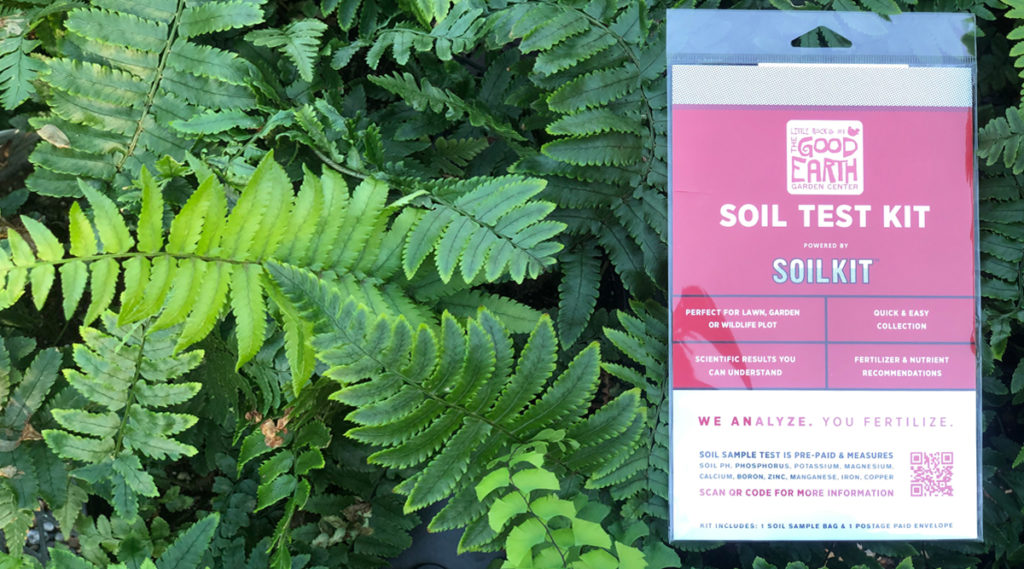Good Earth Soil Test Kits

Healthy plants, properly planted in the right place (sun requirements), and appropriately watered will always grow well… right? Not necessarily! Soil health and composition are key to long term plant success. How do you know how ‘good’ your soil is? A soil test is the best way to find out, and we are very excited to announce we now have Good Earth brand Soil Test Kits! These easy to use kits can be purchased at Good Earth, mailed directly to the lab, with clear, concise recommendations emailed back to you.
How Good Earth Soil Test Kits Work
It’s easy; start by registering your kit. This matches the soil sample you will be mailing out to your contact information. Instructions are on the back of the package and also on the yellow card inside the packaging. After you register your kit, measure the space you want to test, collect soil from 4 different spots in that area, and mix those samples together. Then fill the soil sample bag to fill line, place in postage pre-paid envelop and drop in the mail. Your soil will be tested by a leading national lab, who will then email your results to you. They will also be emailed to us; we love this part because we can take a look at them with you. Which means our team can still help you, even if you don’t have results with you or have trouble accessing them on your phone.
Best of all, you don’t have to remember how to do any of this. On the front of each kit is a QR code that takes you to a website with video instructions on how this works.
Lab Results and Treatment Recommendations
The lab will be testing for all kinds of crucial soil information such as pH, macro and micro nutrients, CEC (Cation Exchange Capacity), and organic matter. The results you get back will give you concise, easy to understand results and recommendations. Up until now, we have only had basic soil kits available here. These gave macro nutrient and pH levels but no specific recommendations. As a result, we often sent customers to their county U of A Cooperative Extension Service office, who then sent it off to a University soil lab. This is still a good option but the difference between those results and our new Soil Test Kit results is vast.
The Extension results have been designed more for farmers growing field crops or managing forage crops for livestock. The results are great, very detailed… but they are also complicated, hard to interpret and sometimes include products not easily found in garden centers.
Our Soil Test Kit test recommendations are more concise. We take those confusing numbers and turn them into a simple report. You’ll receive the lab’s soil report, but you’ll also receive a simple overview and actual product recommendations from our soil experts. For example, if the results indicate you need to add sulfur, it will also tell you how much of our Hi-Yield Soil Sulfur to use for your square footage.
A Few Tips
As you register your sample, you will see that there are four categories for soil samples. Garden, Lawn, Problem Area and Wildlife. Landscape beds falls into the Garden category. Let’s say you have a lawn area that just isn’t growing well and a landscape area where the shrubs don’t grow vigorously. To really see what is happening in both areas, you might consider purchasing two tests and sending them off for separate analysis. Register each kit separately, and give each a nickname so you know which is which.
Why Soil Testing is Important
The interactions of pH and nutrients is complicated, so complicated that we have a blog post just about pH, that goes into more detail about the relationship. Here is a link to that post. Very high or low nutrient levels can affect plant health as well. If you have consistent issues in an area, have done all the ‘right’ things and can’t figure out what’s going on, send off a soil sample. If you are building a new garden bed with a variety of composted material, send off a soil sample before planting.
Soil health is important and getting a soil test is the first step to making sure your soil is as healthy as possible for what you are trying to grow.